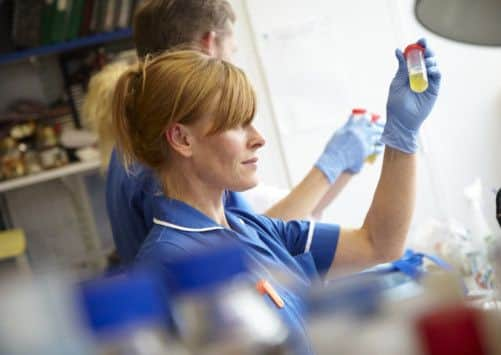Maverick and pioneer whose work is improving odds in breast cancer fight


Professor V. Craig Jordan likes to compare himself to the Dirty Dozen’s Major John Reisman.
He admits the analogy only goes so far. While there is an element of the maverick about him, instead of turning a group of convicted criminals into a commando crack squad, over the last four decades he has instead handpicked young, enthusiastic scientists to carry on the groundbreaking work into breast cancer prevention which he began in a Leeds University laboratory 40 years ago.
Advertisement
Hide AdAdvertisement
Hide AdNevertheless, the point is made and given his achievements, Professor Jordan is forgiven a little artistic licence.


This week it was announced that thousands of women across Britain with a family history of breast cancer are to be offered drugs on the NHS to help prevent the disease. More specifically they are to be given access to either tamoxifen or raloxifene, both of which Prof Jordan pioneered.
The new guidelines, issued by the National Institute for Health and Care Excellence, are the first in Europe to recommend healthy women are given the drugs and behind the headline announcement is a story which began in the 1970s and which involves chauffeur-driven rats, a failed contraceptive and a man who was never supposed to go to university.
“I always had a passion for chemistry and as a teenager my mother allowed me to convert my bedroom into a lab,” says Prof Jordan, who has received numerous international awards for his contribution to medical science over the years. “I set the curtains on fire, I turned the grass orange, but at least she knew where I was. However, while I might have been keen, I was not the kind of child destined to go to university, instead I was going to be a technician at the chemical company ICI. They said as long as I did chemistry A-level and kept myself out of trouble, the job was mine.
Advertisement
Hide AdAdvertisement
Hide Ad“However, one of my teachers at Moseley Grammar School intervened. He told my mother that I was, and I quote, ‘an unusual boy’ and really should apply to university. I sent off one application to Leeds, it was a long shot, but they took a chance on me.”
Arriving at the pharmacology department in 1965 it was to be the start of a long association with the university. A few years later it would also be the scene for his big breakthrough in cancer treatment. Graduating with first class honours, Prof Jordan stayed onto do a PhD on a contraceptive drug which had failed to live up to its job description.
“It had worked marvellously in rats, but unfortunately it had the exact opposite effect on woman,” he says on the phone from Stuttgart where he has just delivered another keynote speech on his research. “The one thing you don’t want in a contraceptive drug is women falling pregnant, but that’s exactly what had happened and ICI had no option but to shelve it.”
Referred to then only by its serial number, Prof Jordan realised that while the specific chemical compounds might not excel as a contraceptive, ICI 46,474 did have other qualities. Following a two- year spell working in America, he returned to Leeds to complete his research.
Advertisement
Hide AdAdvertisement
Hide Ad“ICI agreed to support me and ferried rats over to the university. When I come back to the city now I occasionally bump into one of the drivers who still remember me as the professor who had rats chauffeur-driven to the labs. I had the tools, I had the peer support, but research requires funding.
“I knew Yorkshire Cancer Research gave out money because as an undergraduate I’d done some work for them during the summer holidays, so I put together a proposal and sent it off.”
While Prof Jordan says he doesn’t remember how much he applied for, he got what he wanted when the charity set up in 1925 agreed to a three-year research grant to develop what was then a little-known breast cancer drug.
“Whatever it was, it would sound like a trivial amount these days, but it would have probably been enough to buy a house and five cars back then. Securing funding is important, it teaches you that research is not a right, you have to be able to justify your work. When you can do that, the investment will come and the truth is that the best people will succeed.”
Advertisement
Hide AdAdvertisement
Hide AdIt was 1976 when his first paper on the use of tamoxifen in preventing breast cancer was published. His theory was that if taken over a five to 10 year period, those women with a family history of the disease could significantly reduce the risk of developing cancer. In some cases, he said, it could prevent it forever.
“They thought I was a little crazy; some even said I was dangerous,” says Prof Jordan, who went on to discover similar properties in another drug raloxifene. “The general thinking was that it was only suitable for those in advanced stage of breast cancer and even then was only prescribed for a year.”
The latest recommendations from NICE confirm that either drug taken daily for five years can cut the risk of breast cancer by 50 per cent.
“It is a positive step,” says Prof Jordan, diplomatically declining the opportunity for a told-you-so moment. “However, I think the length of time it has taken to get to this stage is a reflection of the medical profession as a whole. One concern I have is the lack of willingness to go through clinical trials if it is felt there is not enough money in it for the drug companies. Tamoxifen might keep your mother alive, but it is never going to earn anyone a billion dollars.”
Advertisement
Hide AdAdvertisement
Hide AdOne of those already benefitting from Prof Jordan’s work is Zoe Fillingham. Originally from Selby, she watched her mother go through a double mastectomy at 46, and 10 years later a complete hysterectomy. With an uncle also diagnosed with breast cancer, she and her two sisters knew their own risk of developing the disease was high.
“The doctors said it was likely two out of three of us would be carriers of the BRCA2 gene, which would mean we had a 90 per cent risk of breast cancer and a 30 to 40 per cent chance of ovarian cancer,” says the 42-year-old, who now lives in Cheshire. “It turned out just one of us had the gene, but I was the unlucky one.”
The results came back in December 2009. Just two weeks later Zoe was diagnosed with breast cancer, but by then she had already opted to undergo major surgery.
“I made my mind up immediately,” she says. “I wanted a mastectomy and hysterectomy. The youngest of my three children was just four-years-old and to me it seemed a no-brainer.”
Advertisement
Hide AdAdvertisement
Hide AdTwelve months of chemotherapy followed and Zoe is now on a daily course of tamoxifen which doctors hope will prevent the disease returning.
“The treatment of breast cancer has advanced so much since my mother was diagnosed,” she says. “Given people the option of either taking tamoxifen or having surgery has to be a good thing. When you are told that at some point you are more than likely to develop cancer, it’s important to feel in control of the decisions you make.
“Had I been told I had the BRCA2 gene today, I still think that I would have opted for surgery. I wanted a belt and braces approach, but everyone is different.
“My mum was on tamoxifen for five years, I’m on the drug for 10 years and it does buy you some peace of mind.”
Advertisement
Hide AdAdvertisement
Hide AdAs for Prof Jordan, he has refused to rest on his laurels and continues to bang the drum for increased funding for scientific research.
“I wrote to the new head of ICI a while ago about the need to go back to basics,” he says. “I told them how I had been talent spotted by them all those years ago and I was really offering to return the favour, but I never heard anything back. In an age of cloning, I guess drug development is just not sexy enough.
“However, the truth is that it’s people not technology or buildings which make a difference. If you give good people the money to have the freedom to follow their nose, then that’s when really great things happen.”
Region in the front line
Numerous research projects are being funded by Yorkshire Cancer Research.
Advertisement
Hide AdAdvertisement
Hide AdBowel cancer: After spending 15 years studying photographic records of tumours, a new surgery technique has been developed which could increase the chance of survival by 15 per cent.
Lung cancer: A blood test for the early detection of lung cancer is currently being developed at the University of York.
Prostate cancer: In 2005 a team at York University was the first to identify the stem cells believed to be the root cause of the disease.
Tumours: Bradford’s Institute of Cancer Therapeutics has developed a drug using the crocus flower which has the potential to destroy solid tumours.